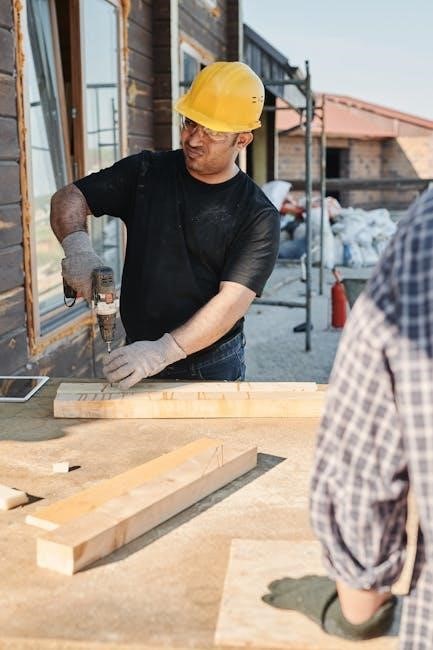Freemasonry is a fraternal organization with roots in medieval stonemasonry, emphasizing moral and intellectual growth. The Entered Apprentice obligation is a foundational promise, guiding members toward brotherhood and self-improvement.
1.1 Definition and Overview
Freemasonry is a fraternal organization rooted in moral and philosophical teachings, emphasizing personal growth and brotherhood. The Entered Apprentice obligation is a cornerstone of initiation, where members pledge to uphold ethical standards and contribute to societal well-being. This commitment reflects Freemasonry’s focus on self-improvement, mutual respect, and service. The obligation binds members to principles of integrity, compassion, and unity, forming the foundation of their Masonic journey.
1.2 History and Evolution
Freemasonry’s origins trace back to medieval stonemasonry guilds, evolving into a speculative fraternity by the 17th century. The Entered Apprentice obligation reflects this transformation, blending historical rituals with moral teachings. Early Masonic texts, such as the Regius Manuscript, laid groundwork for modern practices. By the 18th century, Freemasonry formalized its degrees, with the Entered Apprentice as the first step. This degree symbolizes youth and initiation, emphasizing moral and intellectual growth. Its evolution highlights Freemasonry’s adaptability, preserving ancient traditions while addressing contemporary values, ensuring relevance across centuries.
1.3 Core Principles and Values
Freemasonry is rooted in timeless principles of brotherly love, relief, and truth. These values foster a community of mutual respect and moral growth. The Entered Apprentice obligation underscores duties to God, country, and humanity, reflecting Freemasonry’s emphasis on ethical living. Central to its teachings are self-improvement, compassion, and service to others. These principles guide members to cultivate integrity, humility, and wisdom, creating a framework for personal and societal betterment. Freemasonry’s core values remain universal, transcending cultures and generations, offering a path to enlightenment and harmonious coexistence.

The Entered Apprentice Degree
The Entered Apprentice Degree is the first step in Freemasonry, introducing candidates to the craft’s principles and symbolism. It marks the beginning of a transformative journey.
2.1 Initiation Ceremony
The initiation ceremony for the Entered Apprentice Degree is a solemn and symbolic process. Candidates prepare by reflecting on their intentions and values. The ritual begins in darkness, symbolizing ignorance and the unenlightened state. Through a series of steps, they are introduced to the principles of Freemasonry, including brotherly love, relief, and truth. The ceremony emphasizes moral and spiritual growth, setting the foundation for their Masonic journey. This rite of passage marks their entry into the fraternity, preparing them to embrace its teachings and obligations responsibly.
2.2 Symbolism and Significance
The Entered Apprentice Degree is rich in symbolism, reflecting the candidate’s journey from darkness to light. Tools like the 24-inch gauge and common gavel symbolize self-discipline and shaping one’s character. The cable tow represents a commitment to the fraternity, while the rough ashlar signifies the unrefined state of humanity awaiting moral and spiritual refinement. These symbols emphasize the importance of personal growth, ethical conduct, and service to others. The degree’s rituals and emblems serve as reminders of Freemasonry’s core values, guiding members toward a life of virtue and harmony;

2.3 Preparation and Expectations
Preparation for the Entered Apprentice Degree involves studying Freemasonry’s principles and understanding the obligation’s significance. Candidates are expected to demonstrate sincerity, moral integrity, and a willingness to embrace the fraternity’s values. They should familiarize themselves with the lodge’s structure and rituals, as well as the roles of officers. Post-obligation, they are expected to actively participate in lodge activities, contribute to the fraternity’s goals, and uphold the ethical standards of Freemasonry. The obligation is a lifelong commitment, emphasizing personal growth, brotherhood, and service to humanity. Preparation ensures a meaningful initiation and a strong foundation for their Masonic journey.

The Obligation of an Entered Apprentice
The obligation of an Entered Apprentice is a solemn commitment to uphold Freemasonry’s principles, abide by its teachings, and fulfill fraternal responsibilities, binding the member to the fraternity’s values for life.
3.1 The Ritual and Ceremony
The ritual and ceremony of the Entered Apprentice obligation are deeply symbolic and solemn. The candidate, prepared in a state of darkness and destitution, enters the lodge to embark on a transformative journey. The ceremony includes the recitation of the obligation, a promise to uphold Freemasonry’s principles and duties. This sacred commitment is taken on a Holy Book, emphasizing its binding nature. The ritual is designed to impress upon the candidate the gravity of their vows, marking their formal entrance into the fraternity. The ceremony serves as a foundation for their Masonic education and ethical development.
3.2 Key Components of the Obligation
The Entered Apprentice obligation includes promises to uphold Freemasonry’s principles, respect its laws, and maintain fidelity to the fraternity. The candidate pledges to support fellow Masons, act with moral integrity, and contribute to the well-being of society. The obligation also includes a commitment to preserve the Ancient Charges and traditions of Freemasonry. It emphasizes brotherly love, relief, and truth, forming the cornerstone of a Mason’s conduct. The obligation is sworn on a Holy Book, underscoring its solemnity and the member’s duty to uphold these values throughout their life.
3.3 Historical Context and Development
The Entered Apprentice obligation has its roots in medieval stonemasonry guilds, evolving over centuries to reflect Freemasonry’s moral and philosophical teachings. The obligation, as we know it today, emerged in the 18th century, influenced by Enlightenment ideals. It incorporates elements from earlier oaths, ensuring continuity while adapting to modern values. The obligation’s historical development underscores Freemasonry’s commitment to brotherhood, ethical conduct, and societal contribution. Its evolution highlights the fraternity’s adaptability, maintaining relevance while preserving its core principles. The obligation remains a cornerstone of Masonic identity, reflecting both tradition and progress.
Moral and Ethical Implications
The Entered Apprentice obligation emphasizes truth, justice, and moral integrity, guiding members to uphold ethical standards and contribute to societal betterment through virtuous actions and self-refinement.
4.1 The Concept of Obligation in Freemasonry
The concept of obligation in Freemasonry is central to the Entered Apprentice degree, representing a solemn promise to uphold moral and ethical principles. This commitment, rooted in ancient traditions, binds members to ideals of brotherhood, truth, and service. The obligation is not merely a ritualistic formality but a deeply personal and lasting vow. It emphasizes loyalty to the fraternity and to societal values, fostering a sense of responsibility and unity among members. This foundational principle guides Masons in their personal and communal journey toward enlightenment and moral growth.
4.2 Moral Lessons and Teachings
The Entered Apprentice obligation imparts essential moral lessons, emphasizing virtues such as integrity, humility, and charity. It teaches the importance of faith in a Supreme Being and respect for all humanity. The obligation underscores the value of self-discipline and the pursuit of wisdom. These teachings encourage Masons to lead exemplary lives, contributing positively to society. By adhering to these principles, members foster a culture of mutual support and moral excellence, aligning with Freemasonry’s mission to enlighten and uplift both the individual and the community.
4.3 Ethical Responsibilities to Self and Society
The Entered Apprentice obligation emphasizes the importance of ethical responsibilities, both to oneself and to society. Masons are encouraged to cultivate self-improvement, fostering integrity and moral character. They are also called to act with compassion and justice, contributing to the well-being of others. The obligation underscores the duty to uphold truth, respect the rights of others, and promote harmony in all interactions. By embracing these ethical responsibilities, Freemasons strive to become better individuals and active contributors to the betterment of society, reflecting the fraternity’s commitment to universal brotherhood and moral excellence.
The Lodge and Its Structure
The lodge is governed by a Worshipful Master and officers, operating under a grand lodge. It includes roles like Senior and Junior Wardens, ensuring orderly governance and mentoring.
5.1 Roles and Stations of Officers
The lodge structure includes specific roles essential to its operation. The Worshipful Master leads the lodge, while Senior and Junior Wardens manage ceremonial and logistical duties. Deacons and Stewards assist candidates during rituals, ensuring their preparation and comfort. The Secretary and Treasurer handle administrative tasks, maintaining records and finances. The Tyler guards the lodge entrance, admitting only authorized members. Other officers, such as the Chaplain and Marshal, contribute to spiritual guidance and procedural order. Each role is vital, ensuring harmony and continuity within the lodge, while mentoring Entered Apprentices in their Masonic journey.
5.2 The Lodge System and Governance
The lodge system is governed by a structured hierarchy, operating under charters or warrants from Grand Lodges. Provincial Grand Lodges oversee local lodges, ensuring adherence to governing rules. The United Grand Lodge of England (UGLE) serves as a central authority, maintaining consistency across lodges. Senior officers, like the Provincial Grand Master, enforce standards and resolve disputes. Bylaws and constitutions guide lodge operations, aligning with the broader Masonic principles. This governance ensures the integrity and traditions of Freemasonry are upheld, fostering a unified and organized fraternal network. The system promotes accountability and harmony among members at all levels.
5.3 The Role of Mentoring in the Lodge
Mentoring is a vital component of lodge life, providing guidance to new members, especially Entered Apprentices. Experienced Masons, often senior officers, take on mentorship roles to help newcomers understand their obligations and integrate into the fraternity. This support fosters personal growth and ensures a deeper comprehension of Masonic principles. Mentoring programs, such as the PGLEL Mentoring Programme, emphasize the importance of fostering brotherhood and intellectual development. By sharing knowledge and experiences, mentors help apprentices navigate their Masonic journey, reinforcing the values of Freemasonry and strengthening lodge cohesion. Effective mentoring ensures continuity and enriches the lodge community.

The Significance of the Entered Apprentice Obligation
The Entered Apprentice obligation is a cornerstone of Freemasonry, symbolizing a member’s commitment to moral and ethical principles. It fosters personal and fraternal growth, ensuring unity and purpose within the fraternity.
6.1 Its Role in Personal Development
The Entered Apprentice obligation serves as a foundation for personal growth, fostering a commitment to moral and ethical principles. By embracing this promise, individuals cultivate self-discipline, accountability, and a deeper understanding of their responsibilities. The obligation encourages reflection on one’s actions and their impact on others, promoting introspection and self-improvement. It also introduces essential Masonic values such as brotherly love, relief, and truth, guiding members toward a path of continuous self-refinement. This commitment not only shapes individual character but also prepares members to contribute meaningfully to society, embodying the principles of Freemasonry in their daily lives.
6.2 Its Impact on Freemasonry as a Whole
The Entered Apprentice obligation is a cornerstone of Freemasonry, ensuring continuity and unity across the fraternity. By committing to shared moral and ethical standards, members foster a cohesive community. This promise strengthens the fraternity’s collective identity, as it binds individuals to timeless principles. The obligation also reinforces accountability and mutual support among brethren, creating a foundation of trust and respect. Its universal application ensures that Freemasonry remains a unified and purposeful organization, guided by the same values across generations. This shared commitment enhances the fraternity’s ability to inspire and serve humanity, preserving its relevance and integrity.
6.3 Its Relevance in Modern Times
The Entered Apprentice obligation remains highly relevant in modern times, as its core principles of morality, integrity, and responsibility continue to resonate. In an era marked by rapid change and societal challenges, the obligation’s emphasis on ethical behavior and compassion provides a steadfast guide for personal and communal life. Its teachings on brotherhood and mutual support address contemporary issues like isolation and division. By aligning with timeless values, the obligation ensures Freemasonry’s adaptability, making it a meaningful and progressive force in today’s world. It bridges tradition with modern needs, fostering a sense of purpose and unity.
The Entered Apprentice obligation is a cornerstone of Freemasonry, offering timeless lessons in morality, responsibility, and brotherhood. Its relevance extends beyond initiation, guiding members in their personal and societal roles. By upholding ethical standards and fostering unity, the obligation ensures Freemasonry remains a vital force in modern life. It bridges tradition with contemporary values, providing a framework for self-improvement and service. As Freemasonry evolves, the Entered Apprentice obligation continues to inspire, reminding members of their commitments to themselves, others, and the fraternity. Its enduring significance underscores its importance in shaping both individuals and society.
